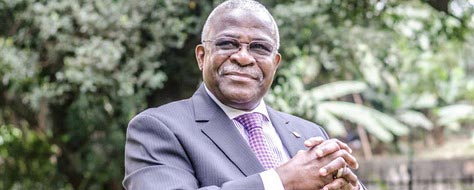
IITA alumnus wins first Africa food prize
Kanayo Nwanze, President of IFAD, and an IITA alumnus, was awarded the inaugural Africa Food Prize at the African Green Revolution Forum in Nairobi, Kenya, on 7 September. In receiving the award, Nwanze said he was dedicating it to “the millions of African women who silently toil to feed their families.”
The Africa Food Prize Committee chaired by Olusegun Obasanjo, IITA Ambassador and former President of Nigeria, selected Nwanze for his outstanding leadership and passionate advocacy in putting Africa´s smallholder farmers at the center of the global agricultural agenda.
“Nwanze is a model for how a great leader can make a difference in the lives of people on the ground,” said Obasanjo. “Whether that leader is the head of a global institution, a head of state, or a head of a small organization, Nwanze’s accomplishments on behalf of African farmers are a reminder of what’s possible when you combine passion, good ideas, commitment, focus, hard work, and dedication.”
Alongside his tireless advocacy, Nwanze is credited with reorienting IFAD’s work to focus more on making small-scale farming a viable business, as well as expanding its presence in developing countries to increase the organization’s effectiveness. The Prize also acknowledges Nwanze´s courage in reminding African leaders to go beyond promising development and change to delivering it.
“I would like to dedicate this award to the millions of African women who silently toil to feed their families,” said Nwanze. “No nation has been able to transform itself without giving women the same rights and opportunities as men. Our hope for future generations rests with African women who bear and raise our young people who will shape the African continent in the years to come.”
The Prize recognizes Nwanze for his individual leadership, but also for the results of successful efforts at IFAD in the years he has been at the helm. Despite a major global economic downturn, he succeeded in growing the Fund´s overall resources, with significant increases in commitments from member states.
As a result of this overall increase in IFAD´s portfolio of loans and grants, its ongoing investments in Africa more than doubled—from US$1.3 billion at the start of Nwanze´s tenure to $2.7 billion in 2015—benefiting more than 75 million rural people.
Nwanze has also presided over far-reaching changes in the way IFAD approaches its work, with a focus on shifting activities from headquarters in Rome to offices in dozens of developing countries.
“I know the difference it makes to see first-hand the value that one’s work is adding to someone’s life,” said Nwanze.
Under Nwanze´s leadership, IFAD has also taken up a more active role in the global policy dialogues. Together with its partners, it advocated for an emphasis on smallholder farmers in the Sustainable Development Goals (SDGs) adopted last year by world leaders, arguing successfully that these farmers have a central role to play in achieving a world free of hunger.
As an advocate for rural communities, Nwanze has consistently called on leaders to keep food security and agriculture at the center of development and budgetary priorities.
By positioning IFAD as a major knowledge institution, Nwanze has also helped provide the development community with fresh ideas, evidence, and tools in support of policy dialogue aimed at identifying the best ways to transform rural livelihoods.
The professional journey that led Nwanze to become a distinguished development leader started 40 years ago in agricultural research. He worked as an entomologist in two CGIAR agricultural research centers, including IITA from 1976 to 1979, eventually becoming the director general of a third one—the Africa Rice Center.
His research background has shaped his leadership of IFAD, where he sharpened its focus on a more rigorous evidence-based approach to project design, implementation, and impact evaluation.
“It is now quite clear what must be done to transform Africa´s agriculture and feed this continent sustainably,” said Obasanjo. “But all of our carefully crafted strategies, plans, and programs will accomplish little without able and visionary leaders. Kanayo Nwanze is one such leader, whose shining example, I hope, will give rise to many others.”
Culled from ifad.org

